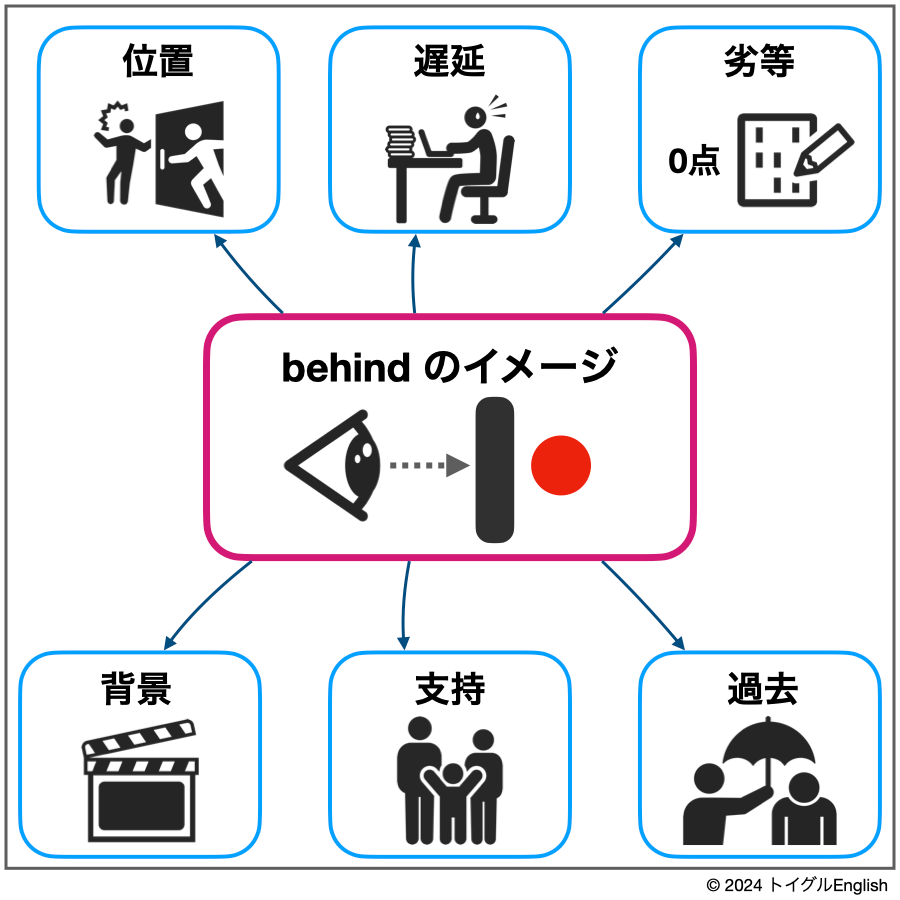英語の behind は「…の後ろに」の意味で使われる前置詞です。
- 例: behind the station(駅の後ろに)
behind の読み方
behind
ビハインド
/bɪháɪnd/
【behind の発音(男性声)】
【behind の発音(女性声)】
behindの使い方(前置詞用法)

1. [位置] …の後ろに
- He stood behind the door.
(彼はドアの後ろに立っていました)
前置詞 behind は「…の後ろに」の意味で、[位置] をあらわします。
behind the wheel は「(車などを)を運転して」の意味で使われる表現です。
- After passing his driving test, he couldn’t wait to get behind the wheel.
(運転試験を通過した後, 彼は車の運転を我慢てきませんでした)
注: wheel は「ハンドル」の意味で用いられます(「車輪」ではありません)。そして、車の進行方向を前として捉えて、ハンドルの後ろに座ることから、運転していると解釈されます。
次の例文を見てみましょう。
- She closed the door behind her.
(彼女は入った後にドアを閉めました)
この文では、彼女は部屋に入った後(あるいは出た後)、ドアを閉めたことを意味します。
決して、ドアを背後に、後ろ手にドアを閉めたわけではありません。
「…の後に続いて」の意味で使われることがあります。
- The hiker followed behind the guide.
(ハイカーは案内人の後ろに続いていきました)
「<人など> のあとに (残して)」の意味で使われることがあります。
- He left his family behind him in their hometown.
(彼は家族を故郷に残していきました)
「from behind O」の形で用いられることもあります。
- The rabbit came out from behind the bushes.
(ウサギが茂みの陰から出てきました)
表面的には from と behind が並ぶため、「二重前置詞」と言われることがありますが、これは適切な名称ではありません。
[behind the bushes] という句(前置詞句と呼ばれることもあります)が、from の目的語になっていると考えると良いでしょう。先ほどの例文の構造は、次のようになります。
- The rabbit came out from [behind the bushes].
尚、from behind のように前置詞句を目的語に取るものには、他に until after などがあります。
- Let’s wait until after dinner.
(夕食の後まで待ちましょう)
ただし、あらゆる前置詞が、前置詞句を目的語に取れるわけではありません。in after dinner といった言い方はできない点に注意しましょう。
- Please put your bag behind the desk.
(机の後ろにカバンを置いてください) - The children love to play in the garden behind the house.
(子供たちは家の裏にある庭で遊ぶのが大好きです) - The cat likes to hide behind the couch.
(猫はソファの後ろに隠れるのが好きです) - The magician disappeared behind a cloud of smoke.
(マジシャンは煙の向こうに消えました) - At the concert, we were lucky to find seats behind the stage.
(コンサートでは, 幸運にもステージ後方の席を見つけることができました) - She was standing behind the counter.
(彼女はカウンターの後ろに立っていました) - The teacher walked behind the line of students.
(教師は生徒の列の後に続いて歩いていました) - I found myself driving behind a slow-moving truck.
(私はノロノロ運転のトラックの後ろを続いて走っていることに気がつきました) - With the baby sitting behind him in the car seat, he drove extra carefully.
(チャイルドシートに座った赤ん坊を後ろに乗せ, 彼は細心の注意を払って運転しました) - Sarah passed her behind-the-wheel test on her first attempt.
(サラは最初の試験で運転免許試験に合格しました)
2. [遅延] …に遅れて
- We’re behind schedule.
(我々は予定より遅れています)
前置詞 behind は「…に遅れて」の意味で、[遅延] をあらわします。
- London is 10 hours behind Tokyo in terms of time zone.
(時差の点で, ロンドンは東京に10時間遅れています)
3. [劣等] …より劣って
- He is behind John in mathematics.
(彼はジョンに数学で遅れをとっています)
前置詞 behind は「…より劣って」の意味で、[劣等] をあらわします。
「(…の分だけ)…に負けて」の意味で用いられることもあります。
- Our team is currently three points behind our rivals in the game.
(私たちのチームは現在, 試合でライバルに3点負けています)
4. [背景] …の背後にあって
- The message behind the movie was about the importance of family.
(この映画の背後にあるメッセージは, 家族の大切さについてでした)
前置詞 behind は「…の背後にあって」の意味で、[背景] をあらわします。
behind のもつ「物理的なモノの後ろ」から、「出来事の後ろ = 背景」として比喩的に用いられる表現です
「…の責任を負って」の意味で用いられることもあります。
- Who was behind the birthday party?
(誕生日会の責任者はどなたですか)
- She asked him about the reasons behind his sudden change in behavior.
(彼女は彼の突然の行動の変化の理由について尋ねました) - They wanted to know the truth behind the strange noises in the old house.
(彼らは古い家の中で聞こえる奇妙な音の真相を知りたがっていました) - He wanted to know the motives behind his friend’s decision to leave town.
(彼は友人が町を離れる決意をした動機を知りたがりました) - What’s behind the unusual behavior of their pet cat?
(ペットの猫の異常な行動の背景には何があるのでしょうか) - I wonder what’s behind the increase in grocery prices at the store.
(食料品の値上がりの背景には何があるのでしょうか)
5. [支持] …を支持して
- Don’t worry, I’m right behind you in this decision.
前置詞 behind は「…を支持して」の意味で、[支持] をあらわします。
「<計画・活動など> を推し進めて」の意味で用いられることもあります。
- The sports team is behind the fund-raising push for new equipment.
(そのスポーツチームは, 新しい用具を購入するための募金活動を推し進めています)
- The family is firmly behind their daughter’s decision.
(家族は娘の決断をしっかりと支持しています) - We’re behind you all the way.
(あなたを全面的に支持しますよ) - The team is very much behind their coach’s leadership.
(チームは監督の采配を非常に支持しています)
6. [過去] <苦い経験などが> (人) の過去にある
- The troubles are behind you now, so focus on the bright future ahead.
(トラブルはもう過去のこと, これからの明るい未来に集中しよう)
前置詞 behind は「<苦い経験などが> (人) の過去にある」の意味で、[過去] をあらわします。
「<貴重な経験などを> (人) の経験として有する」の意味で用いられることもあります。
- He has 10 years of research behind him.
(彼はこれまでに10年の経験があります)
- Put all these worries behind you and enjoy the present moment.
(これら心配事はすべて水に流しましょう, そして今の瞬間を楽しみましょう) - With ten years’ experience behind him, he confidently took on the new role.
(10年の経験を持つ彼は, 自信を持って新しい職務に就きました)
behindの使い方(副詞用法)
1. [場所] 後ろに(の)
- She looked in her mirror to see the cars behind.
(彼女はミラーで後続車を確認しました) - The student came from behind.
(その生徒は後ろから来ました)
副詞 behind は「後ろに(の)」の意味で、[場所] をあらわします。
この behind は品詞としては副詞に分類されます。しかし、例文(上)のように名詞を後ろから修飾したり、あるいは例文(下)のように前置詞の目的語になるなど、通常の副詞とは異なるふるまいをします。
come-from-behind(逆転)の形で用いられることもあります。
- The team had a come-from-behind win in the final minutes.
(そのチームは終盤に逆転勝利をおさめました)
「後に続いて」の意味で使われることがあります。
- She was following close behind.
(彼女はすぐ後ろをついてきました)
「あとに(残して)」の意味で使われることがあります。
- The hikers decided to leave their heavy backpacks behind.
(ハイカーたちは重いリュックサックを置いていくことを決めました)
- He was walking home when he was suddenly attacked from behind.
(彼が突然後ろから襲われた時, 家に歩いて変えるところでした) - With the dog running behind, the children laughed and played in the park.
(犬が後ろを走る中, 子供たちは公園で笑って遊んでいました) - When the storm hit, many decided to remain behind and wait it out indoors.
(暴風雨が襲ったとき, 多くの人が残って屋内で乗り切ろうと決めました) - He was told to stay behind and finish the assignment.
(彼は残って任務を終えるように言われました)
2. [劣等] 劣って
- John has now been left behind in class.
(ジョンは今, クラスから取り残されています)
副詞 behind は「劣って」の意味で [劣等] をあらわします。
behind を使って「0-3で負けている」を言うと、次のようになります。
- The team is behind by 0-3.
(そのチームは0-3で負けています)
- She had fallen so far behind that catching up seemed impossible.
(追いつくのは不可能と思えるほど, 彼女は遅れをとっていました)
3. [遅延] <支払い・仕事などが> 遅れて
- I am now behind in my payments for the credit card bill.
(今, クレジットカードの支払いが遅れています)
副詞 behind は「 <支払い・仕事などが> 遅れて」の意味で [遅延] をあらわします。
「<時計・乗り物などが> 遅れた状態で」の意味で使われることがあります。
- The bus is 10 minutes behind.
(バスは10分遅れています)
- Can you tell me how far behind we are on the project schedule?
(プロジェクトの予定がどのくらい遅れているか教えてくれますか) - I’m behind in doing my homework because I got sick last week.
(先週, 体調を崩したので, 宿題が遅れています) - She has fallen behind with her rent payments.
(彼女は家賃を滞納しています) - The students are getting behind with their homework.
(生徒たちは宿題が遅れ気味です)
behindの使い方(名詞用法)
1.(遠回しに)尻
- He slipped on the wet floor and fell on his behind.
(彼は濡れた床で足を滑らせ, 尻餅をついてしまいました)
behind は「尻」の意味で使われることがあります。婉曲的な表現です。

